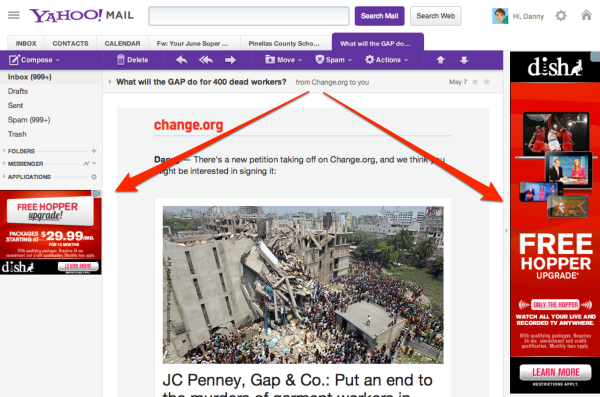As Yahoo Begins Scanning Email To Target Ads, Is It Next On Microsoft’s “Scroogled”
- Fahad H

- Jun 2, 2013
- 4 min read
Did you know Yahoo scans email to do contextual ad targeting similar to the way Google does for Gmail? That wasn’t on my radar, but it is now, as the company is ending older versions of Yahoo Mail and forcing everyone to use the latest version, where terms of service allow for this type of targeting.
Yahoo’s Terms Allow Email Scan & Targeting
The folks at rival StartMail (which is not yet live) sent up the red flag. We got an email highlighting the change. From StartMail’s release:
As of June 1, all Yahoo email users are required to upgrade to the company’s newest platform, which allows Yahoo to scan and analyze every email they write or receive. According to Yahoo’s help page, all users who make the transition agree to let the company perform “content scanning and analyzing of your communications content” to target ads, offer products, and perform “abuse protection.” This means any message that Yahoo’s algorithms find disturbing could flag a user as a bully, a threat, or worse. At the same time, Yahoo can now openly troll through email for personal information that it can share or hold onto indefinitely.
StartMail points over to a Yahoo help page saying that from this week onward, people will have to agree to new terms of service, which include contextual ads. TechCrunch found a nearly identical version of that page with a June 3 start date. From the page:
Where The Ads Come From
Let’s talk more about those ads. I’ve had the new Yahoo Mail for some time, and here’s how ad targeting looks there:

You get ads showing up on the left and right of your email. Where do those ads come from, and how are they targeted? There’s a little “AdChoices” icon at the top of them that, when clicked, tells you:

In this case, I was told that the Dish ads shown to me were based on my browsing activity. I’ve been to the Dish site, and ad network RocketFuel is targeting to me through a partnership with Yahoo.
RocketFuel isn’t the only network that targets into Yahoo mail. Here’s another:

That’s information about how Procter & Gamble showed me an ad, using Google’s DoubleClick system.
None of the ads I checked showed any contextual targeting, where the content of my emails have been read so that ads relevant to what they are about might be shown. Perhaps we’re still a day away from this actually going live. Perhaps I just didn’t spot any. But when this happens, it poses a big issue for Yahoo’s big search partner, Microsoft.
Microsoft’s Attack On Contextual Ads In Email
Microsoft has been attacking Google over contextual ads within Gmail since February, as part its Scroogled campaign, which includes a petition to demand Google change its practices and attack videos like this from Valentine’s Day:
Now, Yahoo has given itself the right to do exactly the same thing that Google does, and if those contextual ads aren’t live yet, they’re clearly coming. They may come from Google, through a new partnership. Potentially, they could even come from Microsoft’s Bing ad network.
All of this puts Microsoft in a tough spot. It’s hard to run a campaign against a competitor, claiming they invade privacy and should be stopped, when you’re partners with another company that is doing the exact same thing, perhaps even with your own ads, earning you money off that “invasion.”
We’re checking with Yahoo and Microsoft for more on this, about whether contextual ads have started; and, if so, what ad networks power them.
Postscript: Microsoft sent this statement:
This is a decision made by Yahoo for their products. Questions about Yahoo products need to be directed to Yahoo. Microsoft does not scan e-mail to contextually target ads on our e-mail offering, Outlook.com or elsewhere. We are not powering this Yahoo product.
Postscript 2: CNET has a follow-up article that basically suggests there’s nothing new here, because Yahoo’s policies haven’t changed. They already allowed targeting, and this is just putting people not currently covered by those policies under them, as they upgrade to the new Yahoo Mail.
That’s not the point. Microsoft has similarly broad privacy policies that would allow it to do contextual ad targeting to email, if it wants. It doesn’t. And until this week, Yahoo was not known for doing contextual ads in Yahoo Mail nor was there any strong indication this might be coming.
Yahoo’s help page about the change has given the impression this may be already happening now or about to happen, because it, unlike the policy page, uses the very specific phrase “contextual-based advertising” in relation to email.
In short, the point is that Yahoo may be doing, or is about to do, contextual ads just like Google.
Does it? After asking Yahoo PR that yesterday via email, it took a day and two further emails to get a phone call back from the company to say that it doesn’t know. It’s still checking on that for me. So stay tuned.
If Yahoo isn’t doing contextual ads in email and has no plans to, then it really is no big deal, just more of the same, other than more Yahoo Mail users than before now have the right be targeted that way, if Yahoo chooses.
If Yahoo is about to do contextual targeting, then those who see privacy issues with those in Gmail now have a new target, Yahoo.




Comments